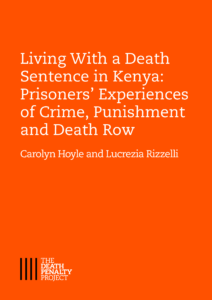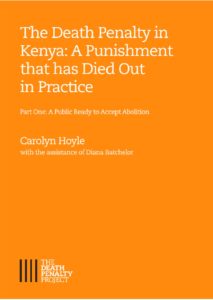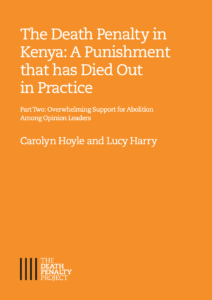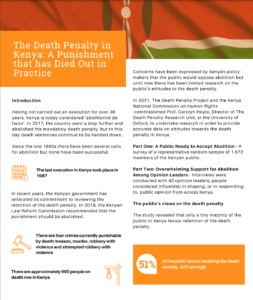Living with a Death Sentence in Kenya: Prisoners' Experiences of Crime, Punishment and Death Row
- Reports and Studies
- 24 Jan 2023
In 2022 The Death Penalty Project partnered with the Kenya National Commission on Human Rights (KNCHR) to commission the University of Oxford to conduct research investigating the socio-economic profiles of those on death row in Kenya.
Authored by Prof Carolyn Hoyle, Director of The Death Penalty Research Unit, at the University of Oxford, and Lucrezia Rizzelli, doctoral candidate at the University of Oxford Centre for Criminology, the findings have been presented in our latest report, focusing on prisoners’ socio-economic background and profiles, their pathways to, and motivation for, offending, as well as their experiences of the criminal justice process and of imprisonment. It complements our previous research, a two-part study of attitudes towards the death penalty in Kenya, entitled, ‘The Death Penalty in Kenya: A Punishment that has Died Out in Practice’
Key findings:
Socio-economic, demographic & welfare profile of prisoners
- Only 11% of prisoners had a prior conviction
- The majority were poorly educated: more than 1 in 10 had never been in formal education
- Their average wage was below the Kenyan minimum wage and more than 1/3 were in debt
- 86% of prisoners were responsible for supporting dependents
Prisoners’ decisions to offend
- 95% of those that committed robbery did not know that it was punishable by death and 86% of those that committed murder did not know
- 72% of those that committed robbery did so were motivated by financial gain
- The majority were not worried about being sentenced to death
Experiences of the criminal justice system and incarceration
- 53% were not given the right to communicate with a lawyer pre-trial
- During interrogation almost half were subject to either psychological or physical abuse
- At trial, 27% were denied an interpreter; 24% were denied legal assistance; 43% did not understand what was happening at their trial
Experiences of incarceration
- Around 1/3 did not have sufficient nourishing food or adequate access to medical care
- Around 2/3 of prisoners said their physical and mental health had suffered since they had been incarcerated
- 2/3 said that their relationships with family deteriorated, with 1 in 10 having no visitors in prison




